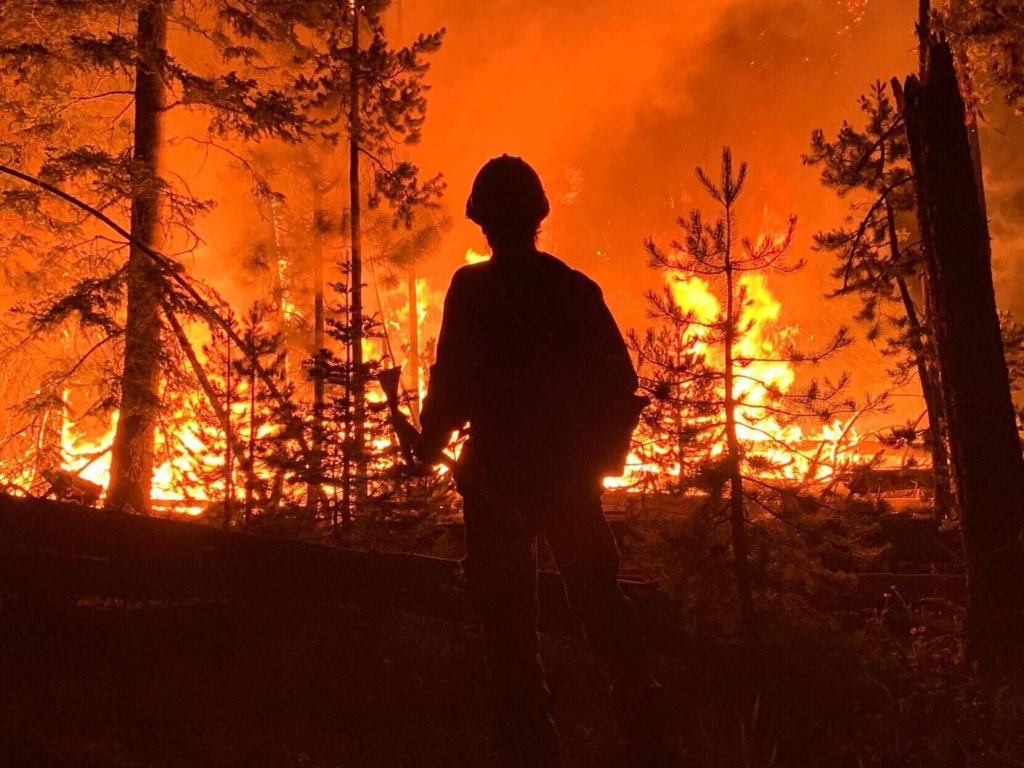Reversal on wildfire crisis, climate change unlikely, Oregonians say
Published 7:00 am Monday, September 6, 2021

- Flames from the enormous Bootleg Fire in Klamath and Lake counties silhouette a firefighter in July 2021. It was one of the country’s largest fires this year.
SALEM — Humankind has little chance of solving the climate crisis and the growing frequency of wildfires. That’s the majority opinion of Oregonians recently polled in a survey conducted by the Oregon Values and Beliefs Center.
Two-thirds of Oregonians (66%) responded that there is only a small chance or no chance at all of reversing the direction of climate change. More than 1,150 Oregon residents aged 18 or older took part in the survey, conducted Aug 9-17. A similar number (67%) said the wildfire crisis in the state will continue to increase.
The concern Oregon residents have about the environment is not without evidence. According to NASA data, Earth’s average surface temperature has risen about 2.12 degrees Fahrenheit since the late 19th century, an increase caused by human activities such as the burning of fossil fuels.
Most of the increase has occurred in the past 40 years, reports NASA, with the seven most recent years being the warmest.
Research provider Rhodium Group reports the U.S. currently contributes 11% of the world’s carbon emissions into the atmosphere. China leads the planet among polluters, contributing 27% of the world’s carbon output. Other leading polluters include India (6.6%), the European Union (6.4%), Indonesia (3.4%), Russia (3.1%), Brazil (2.8%), and Japan (2.2%).
Climate change impacts the planet in a variety of ways, including the melting of polar ice, which causes sea levels rise, as well as droughts, flooding and other extreme weather events. Most Oregonians (54%) believe that climate change is the primary cause of wildfires, the survey said.
What else can be the root cause for the increasing number of wildfires? Some 23% of Oregonians believe the primary cause to be public forest practices allowing excess dead fuels to build up, and 11% said the main cause is environmentalists who oppose forest thinning, the survey said.
Demographic quotas were set to ensure a representative sample of answers for the survey. The margin of error was 1.7% to 2.9%
According to the survey, most Oregonians favor support for environmental causes even if it means slowing economic growth — 76% of respondents said they would lean toward environmental protections compared to just 13% who favor support for the economy over the environment.
The survey showed broadly that Oregonians see climate change as causing severe events such as hurricanes, flooding and forest fires. Among the respondents, 81% believe that climate change is at least partially responsible for creating longer, hotter summers, and 80% believe that climate change is at least partially responsible for the drought.
What needs to be done for humankind to mitigate the impacts of climate change? More than half (60%) of respondents said that both strong individual actions and government regulations are needed while 11% of respondents said no action is needed.
The survey also asked what actions respondents had taken to address climate change. Some 61% of respondents said they have “dramatically” reduced their use of gas-powered vehicles while 57% said they have “examined and reduced important emissions behaviors.” One-third of respondents (34%) said they have communicated to elected officials the need for policies to combat climate change.
Would Oregonians be willing to pay more for gas to help offset emissions? Some 65% said yes, but amounts varied — 13% said less than 25 cents, 9% said 25 cents to 50 cents, and 12% said between 50 cents to $1 extra. Others were willing to splash out more: 9% said they would pay $1-$2 extra, 7% said $2-$4 extra, and 15% higher than $4.
The survey also included data on race and socioeconomic backgrounds. Nine-tenths (93%) of respondents were white or Caucasian; 4% were Hispanic or Latino; 3% were Native American; 2% were African American, and 2% were Asian or Pacific Islander.
Respondents also listed their geographic locality — 44% were from the Portland area, 28% were from the Willamette Valley and 28% were from other parts of the state. There was also a question on political affiliation; 41% were Democrat, 22% were Republican and 13% were nonaffiliated.




